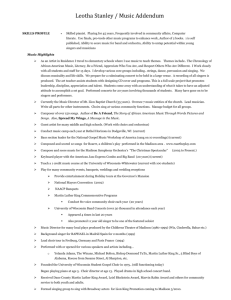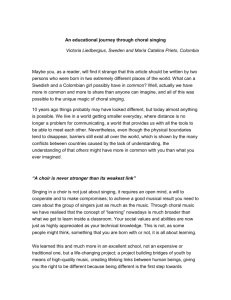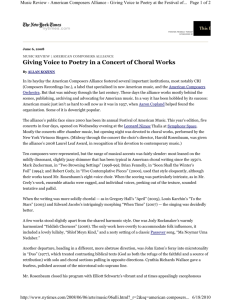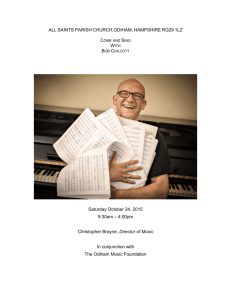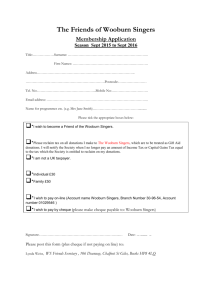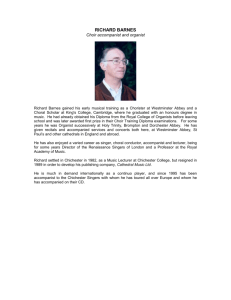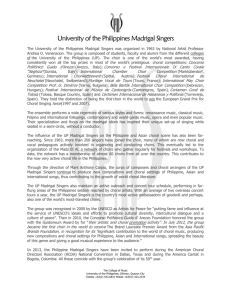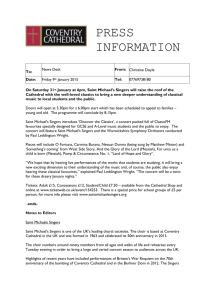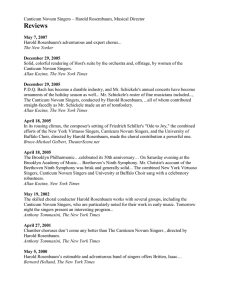The Canticum Novum Singers
advertisement
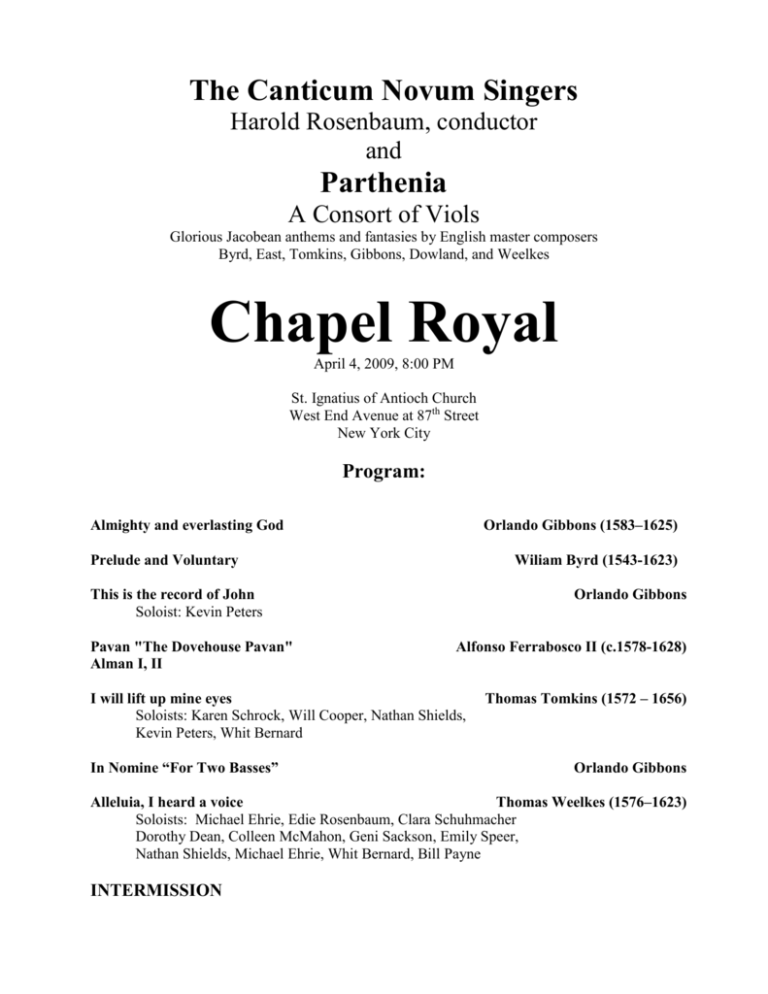
The Canticum Novum Singers Harold Rosenbaum, conductor and Parthenia A Consort of Viols Glorious Jacobean anthems and fantasies by English master composers Byrd, East, Tomkins, Gibbons, Dowland, and Weelkes Chapel Royal April 4, 2009, 8:00 PM St. Ignatius of Antioch Church West End Avenue at 87th Street New York City Program: Almighty and everlasting God Orlando Gibbons (1583–1625) Prelude and Voluntary Wiliam Byrd (1543-1623) This is the record of John Soloist: Kevin Peters Pavan "The Dovehouse Pavan" Alman I, II Orlando Gibbons Alfonso Ferrabosco II (c.1578-1628) I will lift up mine eyes Soloists: Karen Schrock, Will Cooper, Nathan Shields, Kevin Peters, Whit Bernard In Nomine “For Two Basses” Thomas Tomkins (1572 – 1656) Orlando Gibbons Alleluia, I heard a voice Thomas Weelkes (1576–1623) Soloists: Michael Ehrie, Edie Rosenbaum, Clara Schuhmacher Dorothy Dean, Colleen McMahon, Geni Sackson, Emily Speer, Nathan Shields, Michael Ehrie, Whit Bernard, Bill Payne INTERMISSION Hear my Prayer, O Lord Soloists: Karen Schrock, Whit Bernard Thomas Tomkins Flow my tears In darkness let me dwell Come again sweet Love Soloists: Jean Rodie, Charlotte Rocker, Matthew Knuti, Bill Payne John Dowland (1563 – 1626) Pavan Galliard Monusier's Allman from the Manchester Lyra-Viol Manuscipt (c.1660) Fantasia "Triumphavi" When Israel came out of Egypt Soloists: Karen Schrock, Colleen McMahon Geni Sackson, Kevin Peters John Dowland Thomas Simpson (1582-1628) Richard Sumarte (fl. early 17th c.) Michael East (1580? – 1648) Michael East Parthenia is a sponsored project of the New York Foundation for the Arts. Parthenia's concert season is made possible with public funds from the New York State Council on the Arts a state agency. The Canticum Novum Singers is chorus-in-residence at St. Ignatius of Antioch Episcopal Church. We wish to thank Rector Andrew Blume and Music Director Douglas Keilitz for their hospitality. NOTES ON “CHAPEL ROYAL” Psalms, hymns and songs of praise in many forms have been part of public and private worship for centuries, but the anthems on tonight’s program are uniquely English, born out of the English response to the Reformation. In 1549 an act of Parliament caused English to replace Latin as the main language of the church service, and the musical portions of the service that had formerly referred to the Virgin Mary became outlawed in the Church of England. The new attitude was clearly outlined in the Royal Injunctions imposed in 1548 at Lincoln Cathedral: “They shall from henceforth sing or say no anthems of our Lady or other Saints, but only of our Lord, and them not in Latin; but choosing out the best and most sounding to Christian religion they shall turn the same into English, setting thereunto a plain and distinct note for every syllable one: they shall sing them and none other.” Ten years later at the outset of Elizabeth’s reign the rules were reaffirmed with the return of a Protestant monarch: “…it may be permitted, that in the beginning, or in the end of Common Prayers, either at morning or evening, there may be sung an hymn, or such-like song, to the praise of Almighty God, in the best sort of melody and music that may be conveniently devised, having respect that the sentence [sense] of the hymn may be understanded and perceived.” Psalms and other biblical texts were the sources for such anthems and the musical settings like the ones on our program involved either the full choir throughout or the alternation of solo verses accompanied by a consort of viols or organ with the whole choir. The relative stability of Elizabeth’s long and prosperous reign and her own love of music fostered a climate for a remarkable flowering of musical life. Perhaps her most beloved musician was William Byrd, who even though a devout Roman Catholic, was protected by the patronage of the Queen and some of her most influential courtiers from much of the persecution other Catholics suffered during this time. After a musical upbringing as a chorister in the Chapel Royal where, as was the custom in Cathedrals all over England, he would have learned singing, organ, composition and how to play the viola da gamba, he was appointed to be a Gentleman of the Chapel Royal in 1572. The Queen, herself a musician and a tolerant Protestant, recognized his genius and in 1575 granted him a patent with to publish music. This business venture assured the survival much of his music in eight books of sacred Latin music and three books of secular English songs and some of his instrumental music, all published between 1575 and 1611. It is interesting to read in the preface to his 1588 book “Psalmes, Sonets & Songs of sadnes and pietie” that he described these pieces as “being originally made for Instruments to expresse the harmonie, and one voice to pronounce the dittie, are now framed in all parts for voyces to sing the same.” From this we can see that whether the part was texted or not, Bryd’s compositional concept remained the same whether he was writing for instruments or voices. This idea was clearly transmitted to the other composers in our program. Byrd, older than the others by a full generation, was their “Father of Musick”; he laid the foundations for the distinctly English sacred music that they wrote, so that directly or indirectly, they were all his students. He taught Tomkins and probably Weelkes as boys in the Chapel Royal; Gibbons arrived to work there as a young man after a musical education as a chorister in King’s College, Cambridge. Michael East who grew up near Ely, likely had a similar education at Ely Cathedral where he was later employed and like Gibbons received his Bachelor of Music degree from Cambridge. These younger composers worked from Byrd's models but added elements of the Italian music that had become so popular in late Elizabethan and Jacobean England. The instrumental music you will hear tonight covers all the common forms of the time; the fantasy modeled on the anthem and the madrigal; the voluntary, another name for a fantasy such as might have been used in a church service; the pavan, galliard and almain which are here the stylized dances, not actually intended for dancing; and the purely English fantasy known as the In Nomine in which a chant melody from an early 16th century mass by John Taverner (d.1545) was used as the foundation for the composition. Writing an In Nomine must have been a right of passage for English composers since the form existed only in England and was popular for 150 years, from Taverner to Purcell. Some of our composers like Alfonso Ferrabosco and Thomas Simpson wrote virtually no sacred music. They were instrumentalists employed at court – Ferrabosco in England, Simpson in Germany and Denmark where he worked with John Dowland – providing music for the daily needs of their royal employers. Dowland, a master of the art of secular song, is represented here by three of his most cherished songs published between 1597 and 1610. Flow my tears, whose opening melodic motive of four falling notes became an international musical emblem for mourning, was one of the best known and most imitated pieces of early 17th-century Europe. Richard Sumarte is a composer known only by the survival of several pieces in a manuscript collection of solo music for the viola da gamba preserved in the Manchester Public Library. His piece, Monusier’s Almain, is written in the “lyra-viol” manner, in which the player, reading from a special notation known as tablature such as that used by the lutenist, sounds both melody and harmony simultaneously in a robust departure from the elegant counterpoint of the other pieces. Michael East, perhaps the least known of tonight’s vocal composers, published most of his music with a rubric in the title of each book that the pieces were “apt both for viols and voyces.” The fantasy Triumphavi and the verse anthem When Israel Came out of Egypt are found in his print from 1610, and both share the Italian madrigal style that had become so popular in Jacobean England, long after it had been abandoned in Italy. Triumphavi is the second last of a cycle of 8 fantasies moving from despair through repentance to triumph and love. It is fitting in this season of penitence and renewal and the conquest of death by life that we conclude our program with this fantasy and with East’s anthem “When Israel came out of Egypt” whose delightfully painted text tells part of the story of the Exodus, the flight of the Israelites to freedom from enslavement in Egypt. -- Rosamund Morley TEXTS This is the Record of John by Orlando Gibbons This is the record of John, when the Jews sent priests and Levites from Jerusalem to ask him: Who art thou? And he confessed and denied not, and said plainly: I am not the Christ. And they asked him: What art thou then? Art thou Elias? And he said: I am not. Art thou the prophet? And he answered: No. Then said they unto him: What art thou? That we may give an answer unto them that sent us. What sayest thou of thyself? And he said: I am the voice of him that crieth in the wilderness. Make straight the way of the Lord. I will Lift up Mine Eyes by Thomas Tomkins I will lift up mine eyes unto the hills: from whence cometh my help. My help cometh even from the Lord: who hath made heaven and earth. He will not suffer thy foot to be moved: and he that keepeth thee will not sleep. Hear my Prayer o Lord by Thomas Tomkins Hear my prayer, O Lord, and let thine ears consider my calling: Hold not thy peace at my tears. For I am a stranger with thee: and a sojourner, as all my fathers were. O spare me a little, that I may recover my strength: Before I go hence, and be no more seen. Flow my tears by John Dowland Flow my tears fall from your springs, Exilded for euer : let mee mourne, Where nightes black bird hir sad infamy sings, There let mee liue forlorne. Downe vaine lightes shine you no more, No nightes are dark enough for those That in dispaire their lost fortuns deplore, Light doth but shame disclose. Neuer may my woes be relieued, Since pittie is fled, And teares and sighes and grones my wearie dayes Of all ioyes haue depriued. From the highest spire of contentment My fortune is throwne, And feare and griefe and paine for my deserts Are my hopes since hope is gone. Harke you shadowes that in darkness dwell, Learne to contemne light Happie happy they that in hell Feele not the worlds despite. In darkness let me dwell by John Dowland In darkness let me dwell; the ground shall sorrow be, The roof despair, to bar all cheerful light from me; The walls of marble black, that moist'ned still shall weep; My music, hellish jarring sounds, to banish friendly sleep. Thus, wedded to my woes, and bedded in my tomb, O let me dying live, till death doth come, till death doth come. Come again sweet Love by John Dowland Sweet love doth now invite, Thy graces that refrain, To do me due delight, To see, to hear, to touch, to kiss, to die, With thee again in sweetest sympathy. Come again That I may cease to mourn, Through thy unkind disdain: For now left and forlorn, I sit, I sigh, I weep, I faint, I die, In deadly pain and endless misery. Out, alas, My faith is ever true, Yet will she never rue, Nor yield me any grace; Her eyes of fire, her heart of flint is made, Whom tears nor truth may once invade. Gentle Love, Draw forth thy wounding dart, Thou canst not pierce her heart, For I that to approve, By sighs and tears more hot than are thy shafts, Did tempt, while she for [mighty] triumph laughs. ABOUT THE ARTISTS Parthenia, A Consort of Viols Beverly Au, bass viol Lawrence Lipnik, treble and tenor viols Rosamund Morley, treble viol Lisa Terry, bass viol Erica Warnock, tenor viol Parthenia, hailed by the New Yorker as "one of the brightest lights in New York's early-music scene," is a dynamic ensemble exploring the extraordinary repertory for viols from Tudor England to the court of Versailles and beyond. Known for its remarkable sense of ensemble, Parthenia is presented in concerts across America, and produces its own lively and distinguished concert series at Corpus Christi Church in NYC, collaborating regularly with the world's foremost early music specialists and has been featured on radio and television and in prestigious festivals and series including Music Before 1800, Maverick Concerts and the Regensburg Tage Alter Musik. Noteworthy among Parthenia's inventive programs have been a presentation of the complete instrumental works of Robert Parsons at Columbia's Miller Theatre, and the complete viol fantasies of Henry Purcell at the Cathedral of St John the Divine. Parthenia performs often at The Metropolitan Museum of Art, both in Grace Rainey Rogers Auditorium and in the Museum's Medieval Sculpture Hall, and appeared last season at the Yale Center for British Art in conjunction with the exhibition, "Searching for Shakespeare," in a program blending Elizabethan song and poetry. Parthenia has commissioned, premiered and recorded many new works by composers such as Phil Kline, Brian Fennelly, Will Ayton, Randy Sandke, John Stone, Nicholas Patterson, and others, in part through grants from the American Composers Forum, the Camargo Foundation, Roger Williams University, the Viola da Gamba Society of America, and private funds. An ASCAP/CMA Award honored Maverick Concerts' 2002 Season, which included two world premieres of works by Brian Fennelly, commissioned especially by Maverick for Parthenia. Through a 2006 grant from the Jerome Foundation, Parthenia is excited to have commissioned and premiered "Nothing Proved," a new song cycle for viol consort, voice and interactive audio processing, set by composer Kristin Norderval to the extraordinary poetry of Queen Elizabeth I. Parthenia recently released a CD of the works of Will Ayton, "A Reliquary for William Blake," on the MSR Classics label, and has just finished recording a new program of 16th Century French songs, "L'Amour en Mai," set to the poetry of Pierre de Ronsard, with soprano Julianne Baird and Renaissance violinist Robert Mealy. For more information about Parthenia, go to www.parthenia.org. The Canticum Novum Singers, hailed by critics and audiences alike, is now in its 36th exciting season under the direction of its founder, Harold Rosenbaum. During the past 35 years, this chamber choir has achieved both national and international recognition for its stylistic versatility, vocal blend, and expressive range. The ensemble has presented dozens of world, American, and New York premieres by composers ranging from Handel, J.C. Bach, Fauré, and Bruckner, to Harbison, Berio, Schnittke, Rorem, Schickele and George Benjamin. The Canticum Novum Singers has performed in all of New York's major concert halls and has collaborated with The Orchestra of St. Luke's, The American Symphony Orchestra, The Brooklyn Philharmonic, The Riverside Symphony, The Madeira Bach Festival Orchestra in Portugal, L'Orchestre Philharmonique D'Europe in Paris, and The Symphony Orchestra of Budapest in Spain and Andorra. The group has been heard in more than 50 radio broadcasts on WNCN, WQXR, WNYC, WBAI, and NPR. Its "St. John Passion" performance at the prestigious Madiera Bach Festival was broadcast throughout Europe , and its annual recital on WNCN was for years a holiday tradition. The chorus has performed in the P.D.Q. Bach concerts at Carnegie Hall, has appeared with Peter Schickele on WQXR's "The Listening Room," and has performed the music of Mr. Schickele on the Great Performers series produced by Lincoln Center and later broadcast on NPR's program "Schickele Mix." The Canticum Novum Singers and the Canticum Novum Youth Choir were featured in a nationally broadcast episode of CBS Television's 48 Hours entitled The Mysteries of the Nativity. Last year's broadcast: December 25, 2007 at 10PM. Other highlights include concert tours of Italy, Spain, Germany, England, Scandinavia, Eastern Europe, and France; and in this country, seven performances in the Concerts for Peace series at The Cathedral of St. John the Divine, five appearances in the Wall to Wall concerts at Symphony Space, a performance with James Galway, annual performances with The Brooklyn Philharmonic in the Interfaith Committee of Remembrance concerts at The Cathedral of St. John the Divine, Oxford University Press's 500th anniversary concert at Carnegie Hall, five appearances on WQXR's "The Listening Room," live concerts on WBAI, and an appearance on WOR TV's Arthritis Telethon. The Canticum Novum Singers is a recent recipient of a Lincoln Center Community Arts Project award. During the summer of 1996, the group participated in the Siracusa International Music Festival in Sicily, and in July of 1997, it participated in festivals throughout Great Britain. Recent special events include: a tribute to Italian film composer Ennio Morricone at Radio City Music Hall. This concert was also performed at the General Assembly of the United Nations. CNS also performed 200th birthday tribute concert honoring American poet Henry Wadsworth Longfellow, with 5 of his great, great grandchildren participating in pre-concert readings of his poems. The women of CNS, plus members of Mr. Rosenbaum's University of Buffalo choirs collaborated once again with the Brooklyn Philharmonic in a performance of Gustav Holst's "The Planets". And to help Symphony Space celebrate its 30th season of Wall to Wall concerts, the group recently sang Bach's Mass in B Minor with The American Symphony Orchestra. The Canticum Novum Singers has performed over 450 concerts worldwide. It allows elite amateur singers from many different professions the opportunity to perform great choral music at a highly professional level. Admission is by rigorous audition. In this way, the chorus maintains the high standards for which it is so well known. In fact, many listeners are unaware that The Canticum Novum Singers is a volunteer, rather than professional chorus. The Canticum Novum Singers is Chorus-in-Residence at St. Ignatius of Antioch Episcopal Church in New York City. This season The Canticum Novum Singers collaborates twice with The Brooklyn Philharmonic. In the fall, it joins members of Mr. Rosenbaum's University at Buffalo Choir and Westchester Chorale at the Cathedral of St. John of Divine in an American premiere by Josef Malkin in the Interfaith Concert of Remembrance. In the spring it joins Mr. Rosenbaum's New York Virtuoso Singers in the American premiere of John Tavener's "The Beautiful Names," performed at St. Ignatius Loyola Church. Harold Rosenbaum (www.haroldrosenbaum.com) is one of the most accomplished and critically acclaimed choral conductors of our time. He is the winner of the 2008 American Composer Alliance's Laurel Leaf Award, given in recognition of "distinguished achievement in fostering and encouraging American music." Among the recipients of the Laurel Leaf have been the Juilliard String Quartet, Leonard Slatkin, Leopold Stokowski, George Szell, and the Los Angeles Philharmonic. Also in recognition of his leadership in the interpretation and performance of contemporary music, G. Schirmer, Inc. has established its Harold Rosenbaum Choral Series, for which he composes, edits, and gives performance suggestions for conductors. A tireless proponent and advocate for contemporary composers and American composers in particular, he has created an annual choral composition competition, has commissioned twenty five works, has conducted over 250 world premieres (including works by Ravel [in Paris], Schoenberg, Schnittke, Carter, Henze, Berio, Perle, and Harbison), and has recorded contemporary choral music for SONY Classical, Albany, CRI, Bridge, Koch International, Capstone, and DRG. He is also a three-time recipient of the ASCAP/Chorus America Award for Adventuresome Programming of Contemporary Music, and a recipient of Chorus America's American Choral Works Performance Award. To fulfill his dream of conducting the most complex and masterful choral compositions of the 20th century, Mr. Rosenbaum established The New York Virtuoso Singers, an all-professional choir now in its 21st season. "In that domain of the performance of contemporary music which has been most neglected and least supported in this country, there is no choral group which has been more able and willing to perform responsibly the most demanding and knowing of contemporary works than The New York Virtuoso Singers, under the guidance of a sophisticated and understanding conductor. Not only do they deserve and require support, but the fate of contemporary choral music is largely contingent on such support." Milton Babbitt The New York Virtuoso Singers is regularly invited to perform with leading orchestras, and at prestigious institutions such as The Tanglewood Music Festival and The Juilliard School. It has premiered over 200 works by composers such as Luciano Berio, John Harbison, Hans Werner Henze, Louis Andriessen, Shulamit Ran, George Perle, Ernst Krenek, Thea Musgrave, Jonathan Harvey, Arvo Pärt, Andrew Imbrie, and many others. Prior to the formation of The New York Virtuoso Singers, Mr. Rosenbaum had already established his all-volunteer choir, The Canticum Novum Singers (www.canticumnovum.org), as one of New York's premiere choirs presenting the music of all periods, with a special focus on early music. The Canticum Novum Singers has presented over 450 concerts in this country, and on four European tours. Of the more than 500 singers who have been with the choir since 1973, over 100 have moved on to sing professionally, both as choristers and as soloists. This choir has premiered over 60 compositions by composers such as Handel, J.C. Bach, Fauré, Bruckner, Harbison, Berio, Schnittke, Rorem, Schickele, and George Benjamin. Mr. Rosenbaum is a much sought after guest conductor, clinician, adjudicator, funding panelist, coach, lecturer, consultant, and educator. He has taught at four universities including The Juilliard School. Currently he is Associate Professor at the University at Buffalo/SUNY, where he directs the choirs, heads the graduate program in choral conducting, and teaches other courses. A lifelong passion of his has been to bring together choral singers from many different backgrounds and levels of skills to perform. As founder not only of the above mentioned choirs, but of The Canticum Novum Festival Choir, Westchester Oratorio Society, Long Island Jewish Choral Society, and Westchester Jewish Choral Society, and as conductor over the last 34 years of eight university choirs, six church choirs, ten synagogue choirs, a youth choir, and a senior adult choir, he has conducted over 1,450 concerts including ones combining his choirs. Examples include the Verdi Requiem at Carnegie Hall with seven of his choirs, and Haydn's Creation with the Queens College Prep Choir, Transfiguration Lutheran Church Choir of Harlem, and Westchester Jewish Choral Society. For that concert Mr. Rosenbaum was awarded The Most Remarkable Ecumenical Achievement Award by The New York Times. Mr. Rosenbaum is a consultant to the world's largest music print publisher, Hal Leonard, and to G. Schirmer, Inc. Mr. Rosenbaum's productivity has always been startling. During one season he was artistic director of 11 choirs (most of which met weekly). He was a full-time professor one year at both the University at Buffalo and Queens College, while simultaneously conducting 5 non-university choirs. To celebrate The Canticum Novum Singers' 25th season, he conducted 25 Bach cantatas with professional orchestra and soloists, including 11 in one day. During one 3 1/2 week period, he conducted Verdi's Requiem in Carnegie Hall, a 3-hour world premiere in Avery Fisher Hall, Lincoln Center (both of these concerts with the Brooklyn Philharmonic and multiple choirs), Bach's St. John Passion, and a concert of modern music with The New York Virtuoso Singers. In his second appearance at The Tanglewood Music Center, he conducted 7 modern works in the afternoon, and 3 more that evening in the "Prelude" concert for the Boston Symphony. At any given time, he is working on 15-20 current and future projects. One past project stands out in its breadth of scope: the co-production with Merkin Concert Hall, with a grant from the National Endowment for the Arts, of "Voices of the Century", a series of six concerts presenting, in Mr. Rosenbaum's opinion, the 50 greatest a cappella pieces of the 20th century from 13 countries. "Mr. Rosenbaum is not just an expert music director but a bracing programmer." - NY Times Mr. Rosenbaum has collaborated with such composers as Dawn Upshaw, David Del Tredici, Stephen Schwartz, John Harbison, George Perle, William Schuman, Milton Babbitt, John Corigliano, John Adams, Ned Rorem, Charles Wuorinen, Peter Schickele, Augusta Read Thomas, David Lang, Michael Gordon, Julia Wolfe, David Felder, George Tsontakis, Shulamit Ran, Andrew Imbrie, Tan Dunn, Earl Brown, and Tristan Keuris. He has also worked with actors Tony Randall, F. Murray Abraham, Werner Klemperer and Michael York, stage directors Jonathan Miller and François Girard, Barbara Cook, John Buccino, DJ Spooky, and recently with legendary film composer Ennio Morricone and The Roma Sinfonietta in concerts in the General Assembly of the United Nations and at Radio City. Throughout Europe Mr. Rosenbaum has conducted close to 100 concerts, working with the Budapest Symphony Orchestra, L'Orchestre d'Europe, the New Prague Collegium, the Madeira Bach Festival Orchestra, and choirs from the USA and France. Appearances include The Ludlow Festival and the Cheltenham Fringe Festival in England, The Madeira Bach Festival in Portugal, and The Siracusa Festival in Italy. In this country Mr. Rosenbaum has collaborated over 100 times with leading orchestras such as The New York Philharmonic with James Conlon, The Brooklyn Philharmonic (over 55 times) with Robert Spano, Lukas Foss, Dennis Russell Davies, Michael Christie, and Grant Llewellyn, The American Symphony with Leon Botstein, The American Composers Orchestra with Steven Sloane, The Riverside Symphony with George Rothman, The Orchestra of St. Luke's with Sir Charles Mackerras, plus The Juilliard Orchestra, Concerto Köln, The Bard Festival Orchestra, The Westchester Symphony, and many others. He has also collaborated with The Paul Taylor Dance Company, Continuum, P.D.Q. Bach in Carnegie Hall and Avery Fisher Hall, with The Mark Morris Dance Group, Bang on a Can, The Glyndebourne Opera Company, S.E.M. Ensemble, Da Capo Chamber Players, The New York Youth Symphony, and The Bel Canto Opera Company. Mr. Rosenbaum's choirs have performed many times on Lincoln Center 's Great Performers Series, and have appeared on The David Letterman Show, and in concerts with James Galway, Tony Bennett, Licia Albanese, Marianne Faithful, Leonard Slatkin, and The Lincoln Center Chamber Music Society. He has appeared countless times on radio and TV, including an annual national broadcast of an episode of CBS TV's 48 Hours entitled The Mystery of the Nativity. Mr. Rosenbaum was recently appointed Artistic Director of The Sound of the Baltics Choral Cruise Festival (for more information: www.faf.org). This unique festival, based on a cruise ship in the Baltic Sea, invites choirs and individuals from around the world to perform in the major capitals of Northern Europe . He was also recently appointed Artistic Director of The Society for Universal Sacred Music (www.universalsacredmusic.org). The Society will create opportunities for universal sacred music to be performed and heard through concerts, workshops and festivals. He is also on the conducting faculty of the Northern Lights Festival in the Baltics. He is also organist and choir director at St. Luke's Episcopal Church in Katonah, NY. Mr. Rosenbaum resides in upper Westchester County with his wife, Edie, a teacher and singer. They have two married daughters and two grandchildren. Jeremy Faust (B.A. in Music with Honors and the Barrow Prize for Composition, Williams College; M.A. in Music Composition and Theory, U.C. Davis, Faculty Award) is co-founder and Artistic Director of The International Orange Chorale of San Francisco, comprised of 32 committed amateur and emerging professional singers. To date, IOCSF has commissioned or premiered 14 works from emerging composers, two of which are now published by G. Schirmer, Hal Leonard, and Santa Barbara Music Publishing. IOCSF recently collaborated with the Yale Glee Club at San Francisco’s Grace Cathedral. This June, IOCSF will perform with renowned composer Jake Heggie in the California premiere of “Faith Disquiet” and other works. Jeremy currently studies choral conducting with Harold Rosenbaum and is extremely pleased to serve as the assistant conductor for the Canticum Novum Singers in New York City. In the past he has enjoyed masterclasses with Joe Jennings (Chanticleer), Paul Hillier (Hilliard Ensemble, Estonian Philharmonic Chamber Choir), and with Harold Farberman at Bard Conservarory’s Orchestral Conducting Institute. Previously, Jeremy has held conducting positions and/or conducted performances with The Yale Glee Club, The College Light Opera Company, The Mendocino Opera Fresca, the U.C. Davis University and Chamber Choruses (assistant under Jeffrey Thomas), the Williams Concert and Chamber Choirs (assistant under Brad Wells), and the Williams Student Symphony. In 2005 he prepared the U.C. Davis University Chorus for its performance of Terry Riley’s Sun Rings with the Kronos Quartet at the Mondavi Center for the Performing Arts. Active as composer and arranger, Jeremy recently enjoyed the premiere of “Parvus Sum” commissioned by the San Francisco Boys Chorus and performed at the War Memorial Opera House in San Francisco (directed by Ian Robertson), his second collaboration with noted opera librettist and actor Philip Littell. Two choral arrangements have been commissioned by NBC Universal/BBC Productions (under the direction of legendary vocal arranger Steve Zegree), and featured live on national television on NBC’s The Today Show. Other original works have been performed by the Empyrean Ensemble, the Arriana String Quartet, the Upbeat! New Music Festival (Brunswick, ME), the U.C. Davis Chamber Choir (“New York: Night”, his first collaboration with new texts by Littell), California State University-Hayward Chamber Singers, the Williams College Concert Choirs and the International Orange Chorale. Other previous projects include preparing rehearsal arrangements for Michael Morgan and Fredericka Von Stade (for the Oakland East Bay Symphony Orchestra) and composing two multiple award-winning scores for independent motion pictures. His composition teachers have included Pablo Ortiz, David Kechley, Aaron Jay Kernis, Samuel Adler (at the Bowdoin Summer Music Festival), and Robert Suderburg. Jeremy is a second year medical student at the Mount Sinai School of Medicine where he previously earned the M.S. degree in Biomedical Science, studying the cellular basis of HIV infectivity and he now researches and writes about perceptions of HIV in society. MEMBERS OF THE CANTICUM NOVUM SINGERS Sopranos Dorothy Sean Kate Irving Colleen McMahon Jean Rodie Edie Rosenbaum Maureen Saepia Karen Schrock Clara Schuhmacher Tenors Thierry Colin Will Cooper Randy Faust Michael Klitsch Matthew Kunti Kevin Peters Michael Spudic Lee Wiltamuth Altos Claire Fremaux Laura Hartenberger Katia Lindskog Charlotte Rocker Geni Sackson Emily Speer Basses Whit Bernard Charles Cantor Michael Ehrie Jeremy Faust David Green Bill Payne Nathan Shields Parthenia thanks the following individuals and organizations for their wonderful support: George Condo JoCarole Lauder Agnes Gund Daniel Shapiro Time Warner Patricia Wepprecht-Smith Nizam Kettaneh Mary Benton Michael Sivy Phong Bui Janet and David Offensend Virginia and Richard Storr Maspeth Federal Savings Johnson & Johnson Nancy Tooney Rebecca and Thomas Boucher Wendy Steiner David Glaser Gary Thor Wedow Thomas MacCracken Webster Williams Amy Warren Jo-Lin Liang Judith Klotz Pat Hanley Irene and Alan Natow Elizabeth Guiher Louise Basbas Sam Chell Jane Furth and Augie Matzdorf Michael Rigsby Brigitte Segmuller Louise Braverman Patricia Hlafter Mr. and Mrs.Wilber Stewart Hans & Judy Lie Tony and Sue Parisi Naomi and Stephen Antonakos Nancy Goldring Samuel and Linda Kramer Jill Samant Irving and Lucy Sandler Michael & Nina Sundell Regan Heiserman Jeanne Ammon Rafael Gonzalez Jeanette Ingberman Arthur Williams James T. Poulos Lynn B. Donaldson Robert & Rory Motl Margaret Taylor John Whisler Amanda Pond Margaret Brown Rackstraw Downes Paula Gannon Alain and Ariane Kirili Patsy Rogers Hugh Young John Behan Anna Burton Suzanne Darrow Gladys Foxe Manfred Korman Judith Murray Joyce Richardson Virginia Hatley Jody Oliva M.Stefan Draughton Victoria Borus Anne Levine Dr. Guy F. Glass Lewis Baratz Elizabeth Horn Eleanor Fischer Renate Giller Lynn Fergusson Kristen Kelly Fisher Genevieve Christy Lawrence Loewinger Nancy Kennard Alan Goodheart Abufaraj Ramzi Will and Nancy Ayton Beatrice Brewster Hannah Davidson George Houle June L. Matthews Holly Maurer Sara Kennedy Gabriele Vawter Anna-Rose Tykulsker Diana Gordon Elisabeth Cunnick Joan Talbot Winfried L. Mroz Marilyn Acquarulo Norma Cote Nona Mosiej Julia Mount Jean Seiler Peter and Sally Saul Tom Warren Laura and Michael Goudket William Atkinson Joy Hudecz Max Lifchitz Evelyn Simon Grace Feldman Susan Hellauer Cynthia Shaw and David Simonoff Tilda Norberg and George McClain John Carr III Father Raymond Rafferty Nelda Smith Mollie Glazer Beryl E. Hardstaff Erica Warnock Jennifer Basten John H. Burkhalter III Daniel Shulman Hans Gesell Ricardo and Marcia Hofer Brady Lanier Joel Newman Herbert and Lauretta Feldman Kathleen Merfeld Elizabeth Phillips Erica Rubis Carol Scafati Neil Michael Fishman Nancy Fahringer Bonnie Lassen Bettina Carbonell Rita Kaplan James Conmy Thomas A. Anastasio Joseph Feczko The Canticum Novum SIngers thanks the following individuals and organizations for their wonderful support: Mary Flagler Cary Charitable Trust Hitachi America, Ltd. Aaron Copland Fund for Music, Inc. Alice M. Ditson Fund of Columbia Univ. Eubanks, Charles Sherman, Altary Payne, William (Anonymous) Bernstein, Elayne / Scharta, Sol Anonymous 2 Hupper, John & Joyce Robertson, Philmore Burns, M/M Thomas r. Welsh, Dan & Debbie Jones, Ann B. Jones, M/M Richard Anonymous 3 Buckles, M/M Robert McMahon, Colleen Chen, Muguo & Liu, Qunhui McAvey, Eugene & Theresa Giordano, M/M Lucian Frankel, Charles M/M Scribner, M/M Terry Arena, Frank & Maria Gordon, Michael Musgrave, Thea Harbison, John & Rose Schultz, Irene Keilitz, Douglas Fusco, M/M Ben Rosenbaum, M/M Harold Mautner, Margaret Heaton, David & Lucy Mayer, William Havemeyer, Robert Hupper, M/M Craig & Susan Bond, Richard Brand, Thomas Montero, Nuris Cowles, M/M Frederick Dunch, Emma Cannon, Dr. Mark Prudential Foundation, The Rainer, George Rice, Richard Evans, John Lewis, M/M Lauron Silken David & Levine, Maura Fasoli, Deborah Miller, Larry Hooper-Lessin, Dona McDonald, Liz Staubi, Doris Ford, Charlotte Webber, M/M Robert A. Williamson, Logan Roe, Hadley & Mary Lee Ritt, Morey Schoch, Clarissa Pitney Bowes, Inc. Pincus, Daniel Phipps, Amenda Perera, Ronald Pelosi, Mr. Louis Narucki, Susan Miller, Patricia May, Ms. Maura Sorokin, Peter & Anita Koral, Richard M/M Kandler, Judith Kallir, M/M John Hymovitz, Edwin & Natasha Hess, Martha Hellauer, Susan Cremin, Susan Constantinides, CD Clark, Ms.Eleanor Westerguard, M/M Peter Wheeler, Scott Brent, Harriet Allen, Oliver Kress, Yvonne Chaskel, M/M Walter Foley, Ruth & Neil Reiser, Betty Pessah, Michael A. Nachman, M. Sherrill, Forrest M/M Martin. Henry Lee, Clair Harrington, Rev Lynn Goode, Daniel Brings, Allen Sanders, M/M David Ritchie, Stephen Winograd, Kathi Weiselberg, Moriel Albert, Evelyn Anonymous
